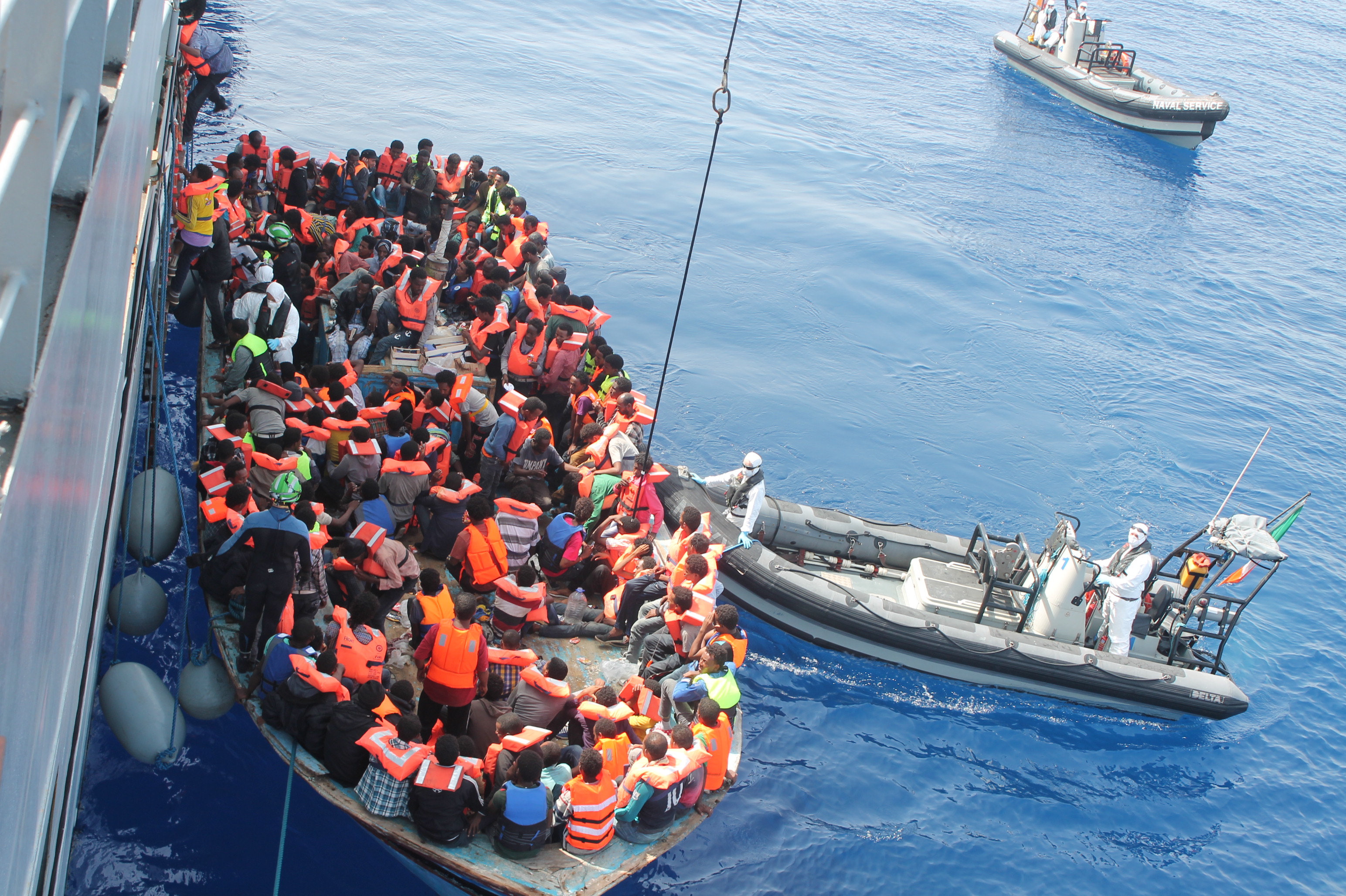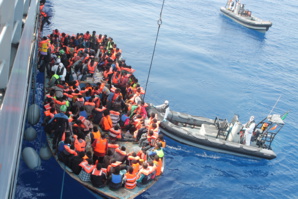European leaders called this agreement a key step towards significant reduction in the number of migrants coming to the EU. On Sunday, The Prime Minister of Turkey Ahmet Davutoglu said that the summit was historically important and marked the beginning of a new relationship between Brussels and Ankara.
The authorities of the EU believe that cooperation with Turkey is the best way to reduce the migrants flow, noting that Ankara has coped with the flow of migrants very effectively.
In addition to strengthening border controls at the external borders of the EU, authorities also hope that the agreement with Turkey will help them cope with the biggest since the Second World War crisis of migrants.
According to the agreement signed on Sunday, Turkey is obliged to tighten control of the Aegean sea and land borders with Greece and Bulgaria, as well as to introduce tough measures against those engaged in illegal transportation of people.
In addition, Turkey has agreed, starting next year, to take back migrants whose applications for refugee status have been rejected by European countries.
In exchange for these measures, the European Union countries promised to provide Turkey with "initial" amount of € 3 billion for the country to accommodate more than 2 million refugees in its territory. Most of this money will be sent directly to organizations that provide assistance to refugees in Turkey, or placement, training and integration of migrants programs developed by the Turkish government.
In addition, European leaders have promised to open a new chapter in the negotiations on Turkey's entry into the economic bloc. They promised to speed up work on establishing the visa-free regime for Turkish citizens arriving in the EU.
Nevertheless, many believe that implementation of this agreement will require significant efforts. The head of the European Council, Donald Tusk said that the EU will watch closely how Turkey will implement this agreement and to make up monthly review of the Ankara’s operation. EU governments also have differences on the issue of who will pay € 3 billion, which Turkey will receive for its cooperation on the issue of migrants.
Moreover, Turkey must meet dozens of the EU requirements to be allowed to visa-free regime by the fall of 2016, but even in this case it is necessary that a visa-free regime was approved by all 28 member countries of the block.
However, Davutoglu admits he cannot promise that the number of migrants heading to Europe via Turkey will decrease.
"No one can guarantee a reduction" - he said of the refugees that are sent to the West from Syria.
In recent months, Turkey has become the main route for refugees from Syria to the EU. This year more than 700 th. of migrants arrived in the EU through Turkey.
The EU tried their best to cope with the influx of migrants. The recent terrorist attacks in Paris and the subsequent operations in Brussels exacerbated concerns about migrants who penetrated to Greece via Turkey.
Davutoglu also said that the year of 2016 could be crucial for Ankara's accession to the EU. "Membership (in the EU) is our strategic goal. This process should accelerate again in 2016," - he said. Turkey’s entry in the economic bloc could "become a reality in the coming years."
Nevertheless, the last 10 years of negotiations have not led to success. During this period, the EU and Turkey held talks on 14 of 35 clauses, that specify joining the EU. Not much of European politicians believe in the fact that the number of technical and political problems which are slowing down the process of Turkey's accession to the block will disappear.
Part of the agreement signed on Sunday suggests that the EU will conduct preparatory work for five blocked chapters in the first three months of 2016.
This means that negotiations on key issues, including justice, energy, defense and foreign policy, could theoretically begin next year.
European Commission President Jean-Claude Juncker wrote a letter to the Turkish Prime Minister, where outline a work plan. Nevertheless, any of the 28 countries in the bloc can put veto on discussions about this new chapter of Turkey's accession to the EU.
Despite the fact that the migrants crisis has strengthened Ankara’s position in talks with Europe, Turkey's domestic problems continue to cause tension and conflict.
For example, two well-known Turkish journalists have been arrested in connection with accusations against the Turkish government, which allegedly supplying weapons to the Syrian opposition. The Turkish government has repeatedly refuted these charges.
Juncker said after the summit that the EU cannot turn a blind eye to these human rights violations, even given the fact that Ankara and Brussels are seeking to strengthen relations.
source: bbc.com
The authorities of the EU believe that cooperation with Turkey is the best way to reduce the migrants flow, noting that Ankara has coped with the flow of migrants very effectively.
In addition to strengthening border controls at the external borders of the EU, authorities also hope that the agreement with Turkey will help them cope with the biggest since the Second World War crisis of migrants.
According to the agreement signed on Sunday, Turkey is obliged to tighten control of the Aegean sea and land borders with Greece and Bulgaria, as well as to introduce tough measures against those engaged in illegal transportation of people.
In addition, Turkey has agreed, starting next year, to take back migrants whose applications for refugee status have been rejected by European countries.
In exchange for these measures, the European Union countries promised to provide Turkey with "initial" amount of € 3 billion for the country to accommodate more than 2 million refugees in its territory. Most of this money will be sent directly to organizations that provide assistance to refugees in Turkey, or placement, training and integration of migrants programs developed by the Turkish government.
In addition, European leaders have promised to open a new chapter in the negotiations on Turkey's entry into the economic bloc. They promised to speed up work on establishing the visa-free regime for Turkish citizens arriving in the EU.
Nevertheless, many believe that implementation of this agreement will require significant efforts. The head of the European Council, Donald Tusk said that the EU will watch closely how Turkey will implement this agreement and to make up monthly review of the Ankara’s operation. EU governments also have differences on the issue of who will pay € 3 billion, which Turkey will receive for its cooperation on the issue of migrants.
Moreover, Turkey must meet dozens of the EU requirements to be allowed to visa-free regime by the fall of 2016, but even in this case it is necessary that a visa-free regime was approved by all 28 member countries of the block.
However, Davutoglu admits he cannot promise that the number of migrants heading to Europe via Turkey will decrease.
"No one can guarantee a reduction" - he said of the refugees that are sent to the West from Syria.
In recent months, Turkey has become the main route for refugees from Syria to the EU. This year more than 700 th. of migrants arrived in the EU through Turkey.
The EU tried their best to cope with the influx of migrants. The recent terrorist attacks in Paris and the subsequent operations in Brussels exacerbated concerns about migrants who penetrated to Greece via Turkey.
Davutoglu also said that the year of 2016 could be crucial for Ankara's accession to the EU. "Membership (in the EU) is our strategic goal. This process should accelerate again in 2016," - he said. Turkey’s entry in the economic bloc could "become a reality in the coming years."
Nevertheless, the last 10 years of negotiations have not led to success. During this period, the EU and Turkey held talks on 14 of 35 clauses, that specify joining the EU. Not much of European politicians believe in the fact that the number of technical and political problems which are slowing down the process of Turkey's accession to the block will disappear.
Part of the agreement signed on Sunday suggests that the EU will conduct preparatory work for five blocked chapters in the first three months of 2016.
This means that negotiations on key issues, including justice, energy, defense and foreign policy, could theoretically begin next year.
European Commission President Jean-Claude Juncker wrote a letter to the Turkish Prime Minister, where outline a work plan. Nevertheless, any of the 28 countries in the bloc can put veto on discussions about this new chapter of Turkey's accession to the EU.
Despite the fact that the migrants crisis has strengthened Ankara’s position in talks with Europe, Turkey's domestic problems continue to cause tension and conflict.
For example, two well-known Turkish journalists have been arrested in connection with accusations against the Turkish government, which allegedly supplying weapons to the Syrian opposition. The Turkish government has repeatedly refuted these charges.
Juncker said after the summit that the EU cannot turn a blind eye to these human rights violations, even given the fact that Ankara and Brussels are seeking to strengthen relations.
source: bbc.com






